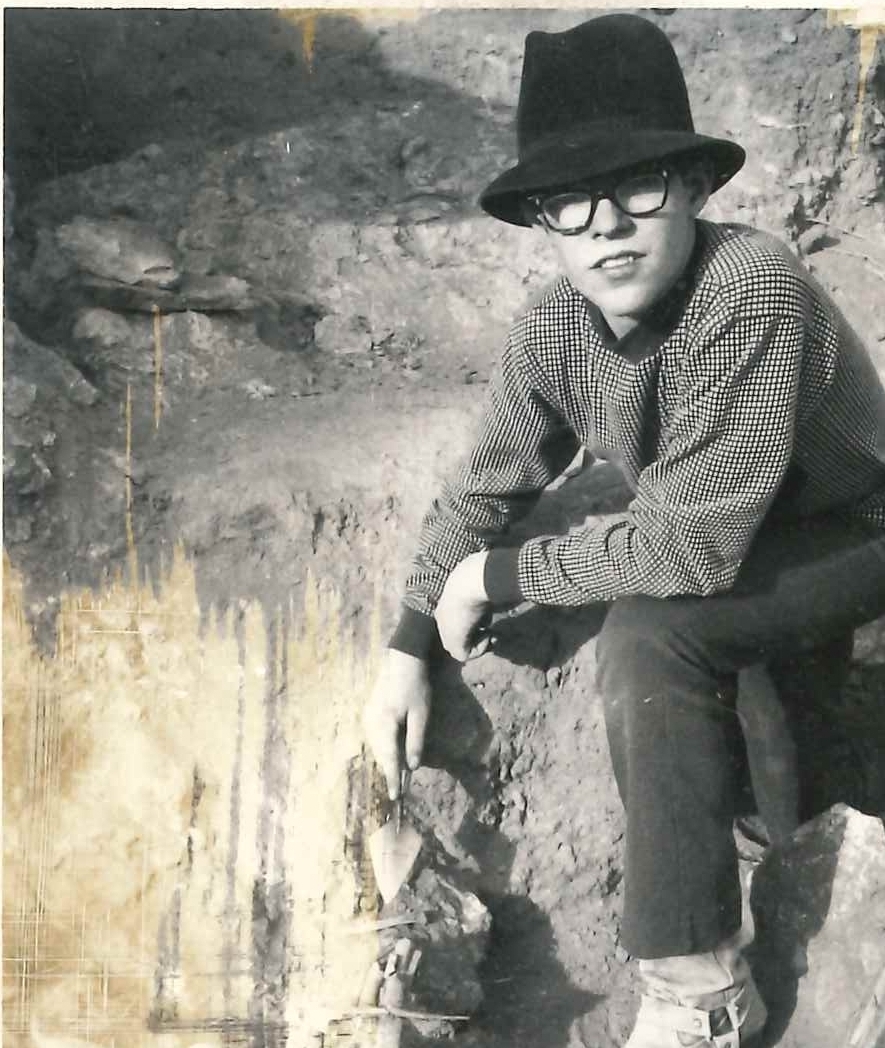Job: Senior Archeologist at Stantec
When and how did you first become interested in archeology?
I consider myself very lucky because when I was in 7th grade I got to volunteer on an archeological dig near my hometown of Tulia in the Panhandle region of Texas. Professional archeologists from West Texas State University (now West Texas A&M University) were digging prehistoric sites in the area that would later become Lake Mackenzie. With another buddy from Tulia, we went out on every weekend for about 4 months and learned archeology from some amazing professional archeologists. They took us under their wings and taught us how to screen excavated fill, what to collect, what artifacts where, and how to carefully excavate and document things that we were finding. Most importantly, they taught us to think critically about the evidence (such as stone tools and fire hearths) we were finding and to appreciate the diverse lifeways of the Native American peoples we were studying.
It was an amazing experience, and it convinced me that I was going to work hard from then on to become a professional archeologist.
What do you love about what you do as an archeologist?
I love it all. I love the outdoors, digging in the dirt to find features and artifacts, doing the background and historical research, and analyzing the collected artifacts back in the lab. I also love thinking about the people who lived there and what their lives were like and writing reports and articles on what we learn.
I have excavated at many amazing archeological sites, mostly in Texas and in the southern US, and I treasure all of the great memories. Even though I am older now (64 in 2023), I am still working on some great sites and making more great memories!

I work with a lot of wonderful people, and being part of team investigating archeological sites is very rewarding. I especially enjoy projects that involve working with descendant communities and lineal descendants. On a recent project in Denton County, Texas, for example, I had the privilege of meeting and working with the direct descendants of Tom Cook, who was an African American Freedman blacksmith in the late nineteenth century. We then hired the blacksmith’s great, great grandson to help us investigate the blacksmith shop. Working together, we found some incredible things that reveal much about the life of Tom Cook and his family. It was a great reminder that archeology is meaningful and relevant to people today.
Another thing that I love about archeology is the variety of tools that we employ to study the past. We dig with tools like trowels and shovels and backhoes, and we use all kinds of devices to map our finds, from measuring tapes to electronic total stations and GPS. We use all kinds of instruments to study the evidence, including magnifying glasses and microscopes.
We then send samples to special laboratories where they are studied by botanists, chemists, physicists, geologists, mineralogists, geomorphologists, and just about any other ___ist you can imagine! We get to work with radiocarbon dating, chemical analyses for identifying rock sources, use-wear and organic residues preserved on stone tools, and DNA of plants, animals, and people. The science is way cool!
What did you do to get to the place in your career that you are now?
I will admit that there was quite a bit of luck involved. I was in the right place at the right time to get introduced to archeology and many great people in the field. I also had wonderful parents who supported my interest in archeology in school. Beyond that, I think what has made me successful in my career is that I am passionate about archeology and all of the past peoples that I study.
I always asked lots of questions of my teachers, my advisors, and my mentors in archeology. I valued their advice. I consciously worked toward my long-term goals of becoming an archeologist. Now my goal is simply to become a better and more thoughtful archeologist.
What advice do you have for a young person who is interested in doing archeology?
Don’t go into archeology because you think Indiana Jones is cool. That’s Hollywood archeology…not real archeology.
If you are passionate about learning and interested in people, you will probably be successful in any anthropology or archeology career you choose. I won’t kid you and tell you it is easy, because archeology can be hard and demanding work both physically and mentally. But if you are working at what you love, it is so much more than just a job.
One thing that keeps me motivated to always do my best, is that I believe that the archeology I do is very important. It gives a voice to people who can no longer speak for themselves. When a professional archeologist digs a site, we may find the structures where people lived and the material things they made and left behind. Whatever we dig up, we have an obligation to think critically about the evidence we find and interpret how the people lived in the past. But it’s much more than just how they made their tools or the ways that they hunted or farmed so they could survive. People long ago worked, played, laughed, and cried just like you and I do, and they told tales of heroes and villains and wondered about the stars and gods that watched over them. The stories of past peoples are important, and archeology is the key tool to help bring them back to life. If you think this sounds like fun, take the time to look more closely at archeology as a possible career.
